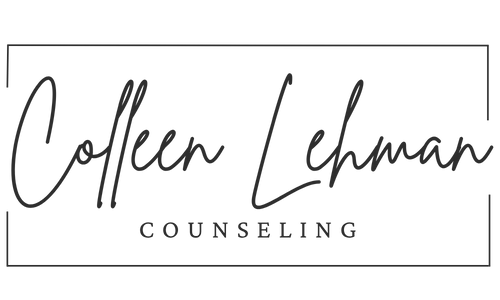Couples Counseling
FAQ: Couples Counseling with Colleen
-
The first three sessions are designed to build a strong, grounded foundation for our work together.
Session 1: We’ll meet as a group of three. My goal is to understand where you get stuck as a couple and begin to see the unique needs, goals, and strengths each of you brings. This is a space where all parts of you are welcome.
Sessions 2 & 3: I’ll meet with each of you individually. These one-on-one conversations help me learn more about your personal history, values, and how you show up in relationships—always with curiosity, never judgment.
Session 4 and beyond: We’ll meet together again. From this point forward, our work will focus on growing deeper connection, understanding, and communication. If meeting individually again ever feels helpful or clinically necessary, I’ll talk with you about it first.
-
After we’ve laid the foundation, our focus shifts to creating meaningful, real-time connection between you.
Most sessions center around you talking with one another, while I support and guide the conversation in a way that helps both of you feel heard, grounded, and safe to be fully yourselves.
We’ll practice:
Clear, compassionate communication
Emotional vulnerability
Reconnecting through shared experiences and emotional presence
Some sessions may involve more active support from me; other times, I may step back to allow space for connection to naturally unfold between you.
-
Sometimes, yes. Homework may include reflection questions, small connection exercises, or practices to try between sessions. These are designed to help you stay connected to the work—and to each other—in grounded, manageable ways. We'll always make sure it feels accessible and aligned with your needs.
-
You're always encouraged to bring what feels most alive or important to you. While I typically have a general intention for each session, I stay open and flexible. This is your space, and your voice matters. We can always adjust our focus to meet you where you are.
-
We’ll check in regularly about how things feel. Therapy isn’t one-size-fits-all, and part of creating a space for growth is making sure you both feel supported, seen, and respected as your full, authentic selves. Your feedback helps shape the process so that it continues to feel meaningful and grounding for both of you.
-
There are a few ways we’ll know that our work together is coming to a close:
Your goals have been met. If you both feel more connected, better able to communicate, and more grounded in your relationship, that may be a natural stopping point.
One or both partners decide to end therapy. You always have the right to pause or end therapy at any time. I’ll support that process with care and respect.
Therapy is no longer the right fit. Sometimes, couples work reaches a place where continued joint therapy may no longer be helpful—or may even become counterproductive. If that happens, I’ll talk with you honestly and compassionately about what I’m seeing.
You want to work with someone else. If you decide you'd like to transfer to a different provider, I’ll support that transition and can help with referrals if needed.
Throughout the process, we’ll keep checking in together. My goal is to support you in ways that feel aligned, meaningful, and true to who you are—as individuals and as a couple.
-
I hold a “no secrets” policy in couples therapy. This means I may share information from an individual session (or any communication outside of our couple sessions) with both partners if it's important for the overall health and progress of the relationship.
I’ll always use thoughtful judgment about what, when, and how to share, and when possible, I’ll invite the person who shared the information to bring it into the couple’s space themselves.
This policy is in place to keep the focus on you as a couple—the relationship is the client. Keeping secrets between partners could create a conflict of interest that would make it hard for me to support you both effectively and fairly.
If there’s something you feel strongly about keeping completely private, I may suggest working with an individual therapist alongside our couples work. That way, you can explore personal topics safely, without impacting the integrity of the shared space we’re building together.
-
Standard couples sessions are 50 minutes and cost $165.
Extended couples sessions are 105 minutes (two 50 minute sessions, with a 5 minute break) and cost $330. These are available upon request, as some couples find longer sessions helpful for intake or deeper work, especially if they need more time to process.
-
I do not accept insurance. All sessions are private pay.
This decision is one I continue to reflect on carefully, as I work to balance accessibility of care for clients with the need to support myself in a way that allows me to show up fully present in our sessions. By not working through insurance, I avoid spending time navigating bureaucracy (like being on hold with insurance companies), and can instead focus that energy on supporting you more directly.
Paying privately also gives you more autonomy. Insurance companies often limit the number of sessions they cover—or only authorize therapy if certain diagnoses are given. Many do not cover couples counseling at all. Paying out of pocket allows us to move at your pace, with the freedom to schedule the number and frequency of sessions that feel right for your process.
If you have out-of-network benefits, I can provide a superbill (a detailed receipt) that you may submit to your insurance for possible reimbursement. I recommend checking with your provider to understand your specific coverage.
-
I offer recurring appointments on a weekly or bi-weekly basis. These consistent rhythms tend to support deeper, more sustainable progress in therapy.
If you're looking for less frequent, maintenance-style counseling, I’m happy to support that—but those sessions will need to be scheduled one or two at a time, rather than as an ongoing recurring slot. I typically schedule these on a quarterly basis, and availability may vary depending on my current caseload.
If we notice a pattern of frequently canceling or missing recurring appointments, we’ll have a conversation about whether it might make more sense to switch to scheduling on a case-by-case basis—or explore if another recurring time might work better for your current needs.
This structure helps me offer consistency and fairness to all clients while also making sure you’re getting the kind of support that fits best for where you are in your process.

